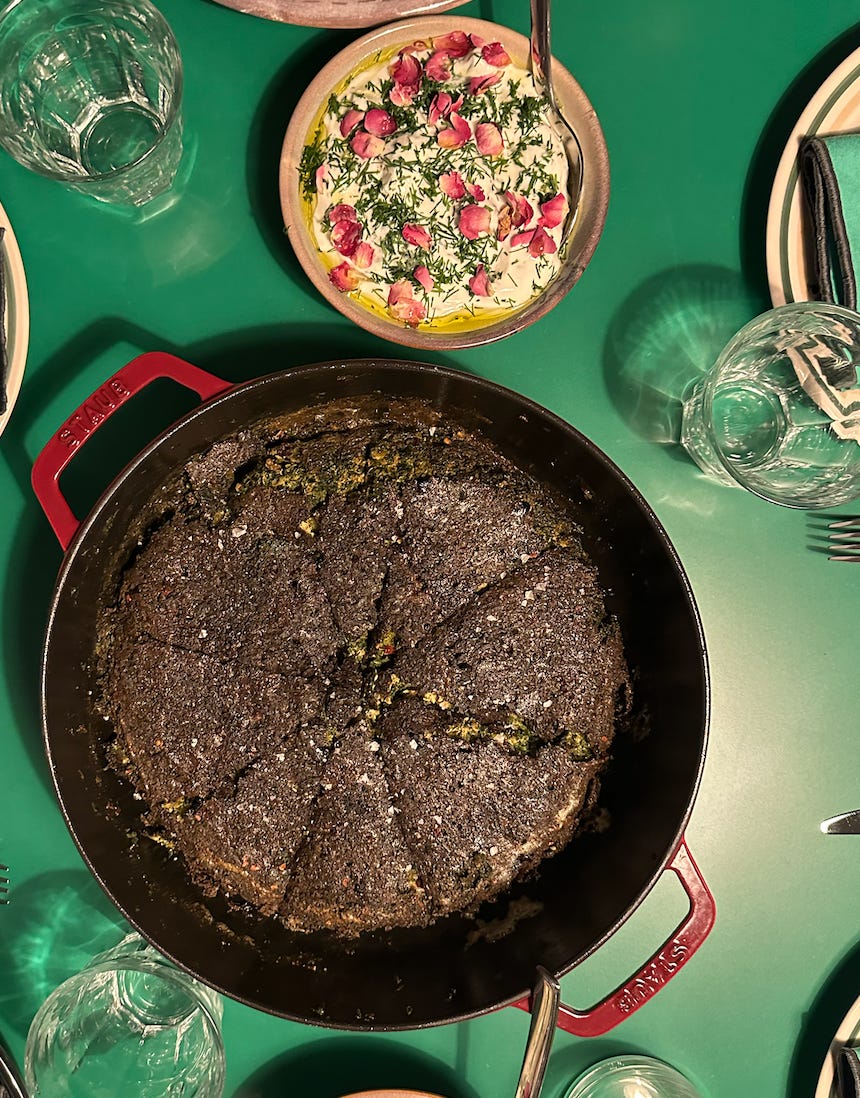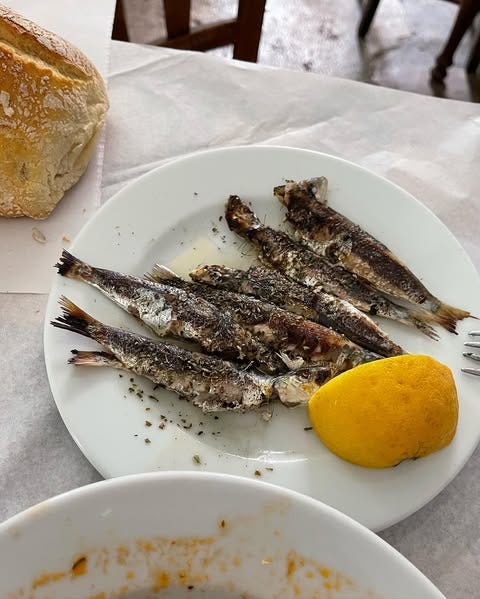Once again, I’ve chosen a subject that is much deeper than a one-off newsletter, but the hospitality recommendation chokehold we exist under has been on my mind too much to ignore this past week.
We live in a time of greed, where information is so easy to access that we believe the insight we require for every venue we visit, for every trip we take, should be gifted to us in a neat and complete package. We seek coverage from various opinions to make a decision, and we will happily forfeit a sense of novelty and discovery in order to feel secure in having made the right call. But is it all worth it?
Our world is full of lists. Our brains and feeds brim with recommendations - whether absorbed or proffered - insider access, top tips, strong suggestions and personal preferences. For a go-to plate, a spot worth trying or a favourite place to eat, we will ask trusted sources for their opinion. We commonly seek recommendations in lesser-known areas of our city, or for a place we’re visiting for the first time, because we’re desperate to make it worth our while. To make the journey and the expense count for something. We want to ensure we have the best information to hand, in the most digestible format possible, to speed up our route to the greatest hospitality experience we’ll ever have.
What happens when recommendations let us down? Or worse, when our expectations get the better of us?

In a conversation I hosted between Ed McIlroy (of Four Legs) and Trevor Gulliver (of St. JOHN) for Gemma Bell & Company’s IN SERVICE 02 in early December, some of Ed’s words stuck with me.
The worst thing to happen to a lot of restaurants is expectations. The people that really love and get my cooking tend to be people that are a bit older than me, because everyone else that’s 30 or under thinks that every time they see something online, they should be going out for the next best meal of their life.
Sometimes (rarely) it’s the best meal of your life, but most often it’s not. A meal might blow you away with certain elements, but hyperbole builds risk of disappointment. Play it down and feel impressed might be a better method. That’s not to suggest we should live in a constant state of minimisation or nonchalance, but in today’s social media frenzy where everything is portrayed too positively to ever be true, a dose of realism could go a long way in keeping our expectations and standards in check.
I get asked for travel recommendations a lot. Usually for Athens (I reckon I’m on 18 requests for “my list” so far this year), sometimes for Paris, or intermittently for anywhere I’ve visited in the last year or few. For Athens, I have a shortlist of favourites, which covers many of the well-trodden spots, so I’m not necessarily providing the inside scoop I assume people come to me for. But just because Diporto is famous, doesn’t mean it’s not worth the visit. You simply need to time it right, and you might not have such a fun time, or be fed off-menu pork chops, if you don’t speak Greek, but that’s why context is key, and links won’t do bias justice.
Like most trending cities, the Athens everyone wants to experience is the Athens they’ve coveted through social media, and that they want everyone else on social media to see them enjoy. It’s been the same for Paris, Barcelona, Lisbon and Marseille in past years. But for many cuisine-led cities around the world, you can easily get away with no phone time, simply walking into places blind (blind to prior knowledge, guided by your own eyes) and have the time of your life, because the energy and culture sits on the surface, ready to be absorbed without much digging.
I like to pin things to Google Maps, and then lazily share them. A) it’s easier and B) the groundwork is in the map. For any visitor looking to have the “best” experience - one that suits their needs and circumstance - it’s down to their own research and their own choices. Having some curated parameters, a condensed index of options, takes out the overwhelm of being faced with somewhere totally new, but without OCD-levels of categorisation, a map is really only helpful to its creator (duh).
I would much rather be asked to chat through my enjoyment of a place, and make suggestions tailored to the requester’s needs, getting passionate about the things that most brought me pleasure, that they might like too, than send over a soulless link.
I feel more comfortable sharing my experiences for places abroad than I do for home. When it comes to London, I seem to only be able to respond to hyper specific requests. Tell me where you want to take your date for less than £40pp near St. Pancras and I’ll give you three combinations for drinks and dinner.
If I’m asked for my favourite restaurant, I freeze. Is your favourite place your most frequented, or the one you enjoy the most? Maybe you visit on special occasions, or only ever visited the one time, but it left a mark. It’s too subjective a question to ever answer accurately, or objectively enough to apply to someone else’s desires. We all have our default places, usually local to us, so what is it to have a preference, a preferred place? And what happens if you get extra special treatment?
I went on Foundation FM with my friend Maria (of Mam Sham) on Monday, and she asked me for my go-to spots in London, where I would suggest people eat. I couldn’t answer (bar my beloved Ustun) until it flipped to a question of where I was interested in going myself: to eat, not just drink, at Yuki, to try Costas’ cooking at Halepi, to dine again at Miga and to try Calong in a couple of months. I forgot to mention the life-altering lasagne I had at Leo’s a few weeks ago when we discussed the best places I’d been recently, and how well I believe the team have set Leo’s up as an instant classic. This is what happens when you don’t do your homework before a live show... so I’m telling you now, go to Leo’s, though the lasagne won’t necessarily be on the menu.
In the last two weeks I’ve dined at Bar Valette, Gorka, Tasca at Cav, Song Que, The Park, Padella, Tamila, Max’s Sandwich Shop and Gordo’s. Some work-related, a few personal affairs, some re-visits and a few new places, but which would I most recommend? The Park for the right people and anyone who likes a good loo, Cav for Josh’s cooking as soon as you can, and for the 360 experience in a month or so once the interiors are complete, Gorka in mid-April as their Italo residency is fully booked for this week, and Tamila all day everyday because Prince and Glen are building something impeccable.
This past weekend, the FT Weekend Magazine launched their new Fantastic Four line up of food and drink writers, and to mark the occasion, editor Harriet Fitch Little commissioned their rules for eating out in 2025, which were put to a more diverse panel to dissect. A novel format I thought, but one that’s faced some backlash for being out-of-touch, mostly from the POV of the foursome of opinion-makers who collectively have a century plus of experience as professional diners. Then again, the FT knows its core audience.
Jonathan Nunn and Jesse Burgess were both included in the response panel, and it struck me that these two men have built their names as pillars of the new guard of food media - if on opposite ends of the spectrum - through their reputations as restaurant recommenders. What they’ve each created is now so much more than just that, but the former started out by highlighting good food outside of London’s Zone 1, and the latter used celebrity faces and opinions to build credibility.

Last year, David Jay Paw delivered us An Opinionated Guide to London Food, described in the publisher’s note as a finely reduced sauce of opinion and a tasteful guide on where to eat. Food puns aside, the premise of this pocket sized handbook is a curated point of view: Information Is Dead, Long Live Opinion. The inclusions are all of a certain quality, with a well-educated perspective in mind, offered in a digestible format. It might be subjective, but to me, it feels pretty comprehensive. I guess I’m the book’s audience, and after flicking through it again this morning, I’m looking to dine at Sushi Show as a priority.
At what point will we reach recommendation saturation point? What is our collective and personal recommendation capacity? When will we tire of lists, and who will remain our most trusted source?
No matter how many reviews - from professional critics to common people - there are about a place, whether in broadsheet newspapers, on maps and in apps, in those wispy-voiced TikTok videos or in the Michelin Guide, the only opinion that matters is your own, in the specific circumstances that you experience it. You have to be okay with taking risks, accepting that sometimes they won’t pay off, and that no two dining experiences will ever be the same.
And the one most important thing to keep in mind and respect above all else, as David says, is that
Behind every busy restaurant is a group of people doing their best every night to craft magic and memories for their customers. And to me, that’s what restaurants are all about.
If you care to know, my current failsafe directory for building out a map of someplace new to me - because I like the hunt and don’t often ask friends - is Amigo. The app is not paying me (I wish) but I like that with more and more people signed up to it, you can now go down some decent zig-zagged internet holes through it. Cross-reference your findings with Google Maps and you’re flying – but you have to put in the time. Because nothing good comes from minimal effort, we all know that.






Didn’t even manage to touch on gatekeeping, tickboxing or expiry dates on lists — so much to say always
I loved this read! Thank you for sharing. A few months ago, I made a silly 2x2 to try to map out my experiences with restaurant recommendations while traveling (https://sophiaisvoracious.substack.com/p/what-you-eat-on-vacation-and-why) — I found that the places I loved the most were ones I stumbled upon or were from a specific source. In a world full of "curators" and "maximizers" it's easy to fall into a trap of blindly trusting or, the more common trap I find myself in, refusing to try anywhere that hasn't been recommended. That said, I will probably continue to use Beli, Amigo, and whatever the app of the day is 🤪